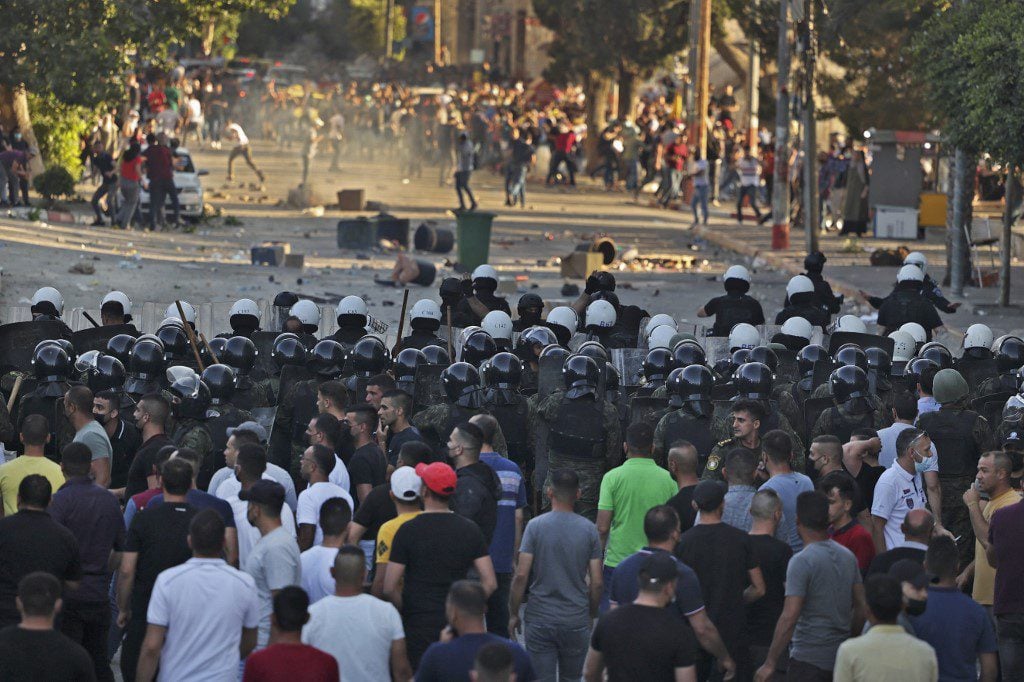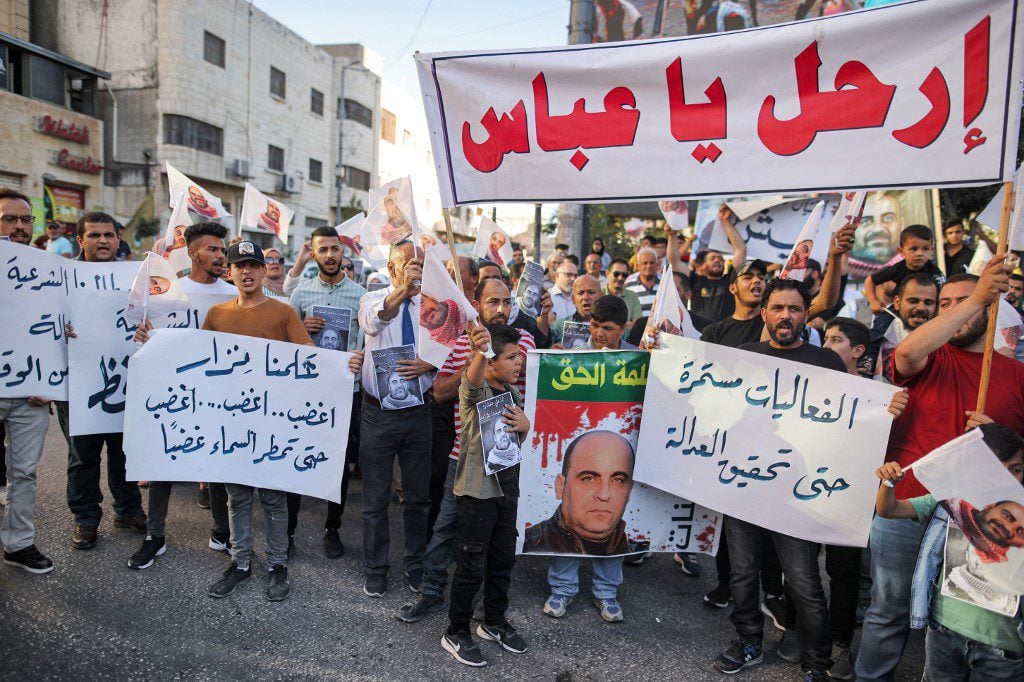
Sophia Akram
A brutal crackdown by the Palestinian Authority (PA) on Palestinian journalists and protesters has been ongoing since demonstrations arose following the death of prominent Palestinian activist Nizar Banat on 24 June 2021. Amnesty International called it “a chilling campaign of repression”.

Protests started out small and peaceful in several cities in the West Bank, in which attendees called for accountability. PA security officials reportedly moved quickly on crowds using tear gas and sound bombs once people started chanting “Leave leave Abbas”, seeking the resignation of the 16-year-serving Palestinian President Mahmoud Abbas.
According to reports, protesters were physically assaulted by police and Fatah loyalists while it also surfaced that journalists and human rights activists have been targeted by the PA forces while documenting the protests.
Reports say many female journalists also complained of being sexually harassed and threatened with rape.
Attacking a girl’s integrity is one tactic used by Palestinian security forces — Palestinian General Intelligence Service (GIS) and Palestinian Preventive Security (PPS) — which in a conservative Palestinian society could have serious ramifications, says Muath Hamed, a Palestinian journalist based in Spain.
Other ways include attempting to take down social media accounts or spreading rumours that the individual has collaborated with Israelis. People of most interest are those with a degree of influence over the Palestinian audience, particularly social media, says Hamed.
Such methods of propaganda, he says, have been used for at least 10 years. By targeting journalists, authorities hope to stop the documentation of what is happening on the ground and spread fear among other journalists.
Hamed, himself, recounts how he left Palestine due to physical abuse and threats to do with his reporting and he remains vigilant today of repercussions.
“What happened to Nizar Banat. They don’t have any red lines, those people”, he told Fanack.
The UN, EU and US have all called for an investigation after having “serious concerns about Palestinian Authority restrictions on the exercise of freedom of expression… and harassment of civil society activists and organisations”.
Journalist and activist Mais Abu Ghosh described on video, published by Middle East Eye, scenes outside the Al-Birah police headquarters in Ramallah when she was dragged and beaten by Palestinian security forces.
“We were protesting in front of the police headquarters. We were only demanding they release the young men in detention”, she began explaining how after only a short while, male and female police officers started descending on the crowd and used pepper spray on prominent journalist Hind Shraydeh whose husband was detained.
“I found myself being dragged across the street by two female police officers who told the male officer to come hold me and beat me. She kept dragging me and told the men to come hold me and beat me… They wanted us to sign a declaration, but we refused. We called a lawyer after repeatedly saying we need to consult a lawyer, he told us don’t sign. They told us this is just a procedure to ensure you respect the law. We told them we did not do anything that disrespects the law that requires us to sign”.
Banat, who died at age 43, was also an ardent critic of the PA and warned in videos posted on his Facebook page before he died that he feared he was being targeted.
Officials say he suffered neurological shock, which resulted in acute heart and pulmonary failure but his family rejected their findings and recounted how more than 20 PA officers broke into his home while he was in bed and started beating him with sticks and metal before taking him away.
Security footage secured by the Quds News Network appears to show the first moments of Banat’s retrieval.
An autopsy has also confirmed the activist suffered blows to the head and died an unnatural death.
Banat often took to social media to criticise the PA and advocate for free speech. His Facebook account had 114,000 followers.
He was formerly a Fatah member but more recently had himself been campaigning as an electoral candidate.
Along with his wife and children in the house with him, Banat had been previously fired at in May 2021 and he believed the Fatah Party were behind the attack and called on the EU to cut aid to the body, the bloc being one of its biggest donors.
Banat also denounced the PA’s cooperation with Israel, slamming its agreement to take a million COVID-19 vaccines close to expiration in exchange for a future shipment of Pfizer vaccines.
Israel has also been allegedly cooperating with the PA over the detention of key activists, such as human rights lawyer Farid al-Atrash, who was active in the current protests and has been a vocal critic of the PA’s crackdown on dissent. He was arrested by Israeli authorities while passing through a Bethlehem checkpoint.
Some have commented on what appears to be a mutually beneficial security agreement whereby PA forces arrest nuisance activists and hand them over to Israel.
Banat also accused the PA of various silencing methods after it killed dissidents. This pattern of suppression has been documented by human rights groups for years now.
In 2017, the PA shut down 30 websites critical of the governing body while one year before, human rights groups warned against PA authorities arresting, abusing and criminally charging journalists and activists who peacefully criticise the authorities, after it documented a pattern of abuses since 2015. The media freedom group MADA also recorded 192 incidents in that year — a 68 percent rise from the previous year —where journalists’ right to free expression was infringed upon via the use of arbitrary arrest, physical assault or banning certain stories for reporting.
Broad opinion is that Abbas is desperately trying to cling to power amid waning popularity. Proponents of the leader fear instability in a post-Abbas world but the tightening grip and increasingly authoritarian securitisation by the PA has been a seeming blind spot by the international community who have been more preoccupied with Israel and Palestinian cooperation.
Elections have not taken place since 2006, in part due to the decreasing utility of the Palestinian Legislative Council, and despite Abbas’s mandate expiring in 2009. Abbas cancelled elections scheduled for May this year, claiming uncertainty about whether Israel would allow polls to proceed. However, observers say Abbas fears he will lose power.
In those interim years, Abbas has managed to build up the security apparatus in the West Bank to help reinforce his position of power by helping to enforce repression, according to the European Council on Foreign Relations (ECFR).
Now, Palestinian journalists want officials responsible for attacks on the press to be held accountable, such as the PA’s chief of police. The Palestinian Journalists Syndicate has called for a global boycott of PA press conferences until that happens, but Hamed doubts the body will ensure meaningful action, believing it is too close to elements of the PA.
Instead, the international community could have the most impact applying pressure on the PA to stop abuses.
“The PA are very sensitive to its picture in the international community. So, if the international community tried to move against the PA, the PA will panic. [We can see that] is happening right now”.


